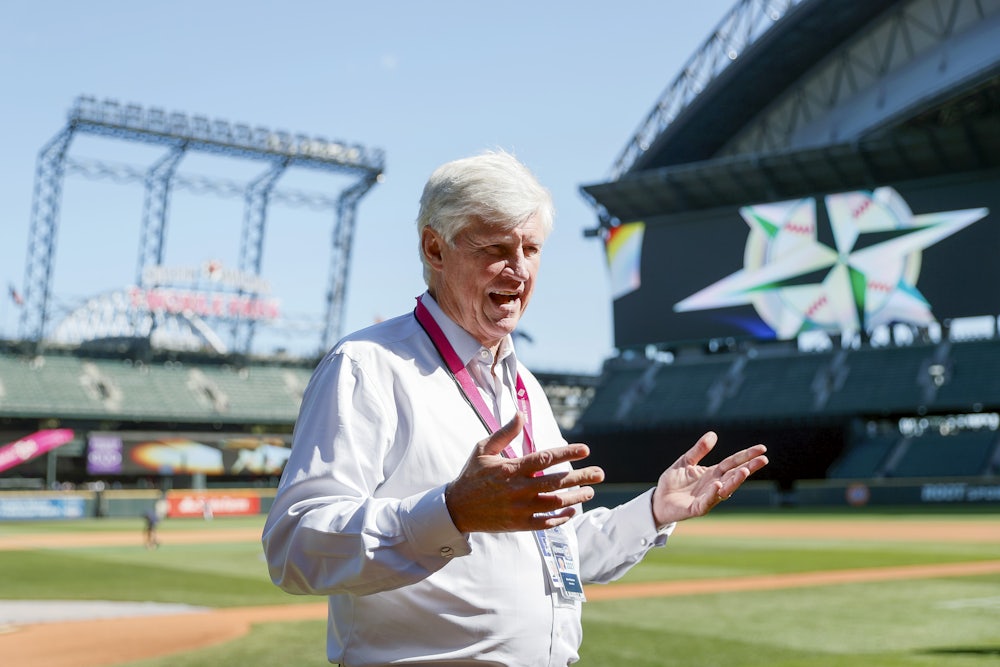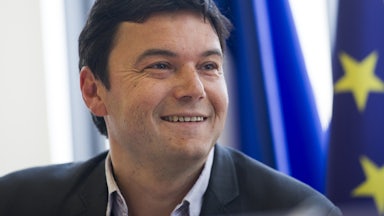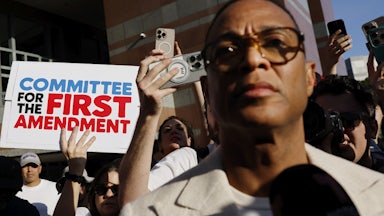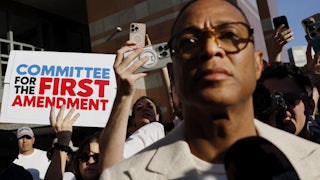Katie Wilson, who was just elected Seattle’s mayor by a narrow margin, is a new brand of college dropout. When she quit Balliol College, Oxford, in 2004, she didn’t plan to launch a start-up. She left Oxford because, without a college degree, she figured she’d never have to become a management consultant at McKinsey.
Wilson’s wish came true. She’s spent the last two decades in Seattle busking, working construction, and organizing transit riders. Now, after enduring a bruising billionaire-funded attack campaign by incumbent Bruce Harrell, she’ll be sworn in on January 1 as Seattle’s first socialist mayor.
Wilson’s unexpected victory is the latest defeat for oligarchic politics. After she bested Harrell in the nonpartisan August primary by pledging to make Seattle more humane by taxing the rich, the city’s billionaires snapped to attention. First, real estate developers, spooked by Wilson’s zeal for rent control and social housing, gave generously to a pro-Harrell PAC. The billionaire co-owners of the Seattle Mariners, T-Mobile founder John Stanton and crypto baron Christopher Larson, followed close behind. In the end, the Harrell PAC raised more than four times as much as the Wilson PAC. Harrell also nabbed the endorsement of Pete Buttigieg (Oxford, 2007; McKinsey, 2007–2010).
On September 30, the Seattle alt-weekly The Stranger wrote Wilson’s political obituary: “If history teaches anything, you can buy the Seattle mayoral election for the right price.”
But sometimes history teaches bupkis. Wilson’s individual campaign, which unlike the PACs carries a contribution cap of $550, raised over $921,000. And in the end, her campaign was simply more cost-effective. It spent $2.98 in PAC money per voter, where Harrell’s campaign spent a whopping $13.32. In my back-of-envelope McKinsey calculations, this means that socialist Katie Wilson got a better ROI than the oligarchs.
The problem for billionaires is, as the Brits say, written on the tin: It’s their billions. Lately, once the money of the private-jet set enters a campaign, the stink of the oligarchy sticks to the campaign and the candidate can be attacked as a corporate tool. An opponent can then do what Wilson did and accurately present herself as a friend of the worker and a foe of the rich. When Zohran Mamdani, mayor-elect of New York City, congratulated Wilson on Friday, he posted, “Seattle voters made their voices heard: they want a new kind of politics—one that rejects corporate PAC money and delivers for working people.”
But the fact that the superrich are in social disfavor is not their only problem. It’s how they spend their money: far too much on advertising. Harrell’s billionaires spent on an attack ad that ran during a Mariners game in late October, but the mandatory donor disclosure statement eclipsed the ad’s content, shining a spotlight on Stanton, the Mariners’ majority owner. The Wilson campaign immediately pounced—and portrayed Harrell as a stooge of the rich. Stanton’s donor money went up in smoke, and the Mariners went on to lose the playoffs.
According to a comprehensive study last year, political ads are a crap shoot. No one can predict what will be effective. And then there’s the collapse of TV. Not only are 50 percent of young voters forgoing TV entirely, but 38 percent of voters under 64 are. And then there’s evidence to suggest that the young have even begun to balk at anything with the merest whiff of TV-style polish.
Talia Mayden, a Gen Z design influencer and onetime commercial director, broke this down for agencies recently. “If you’re shooting a social media campaign, and there are 40 people, 20 of them clients, on set, and you’re sending out call sheets and there’s pre-pro meetings, it’s over.” Mayden concluded: “Gen Z and Gen Alpha can smell production value. Production value is not your friend. Production value is blood in the water.”
A big lesson of this cycle is indeed that overworked, overcapitalized ads backfire. Think of the moldy “Dr. Evil” AI spot run by Andrew Cuomo’s campaign against Mamdani. The cringe bomb turned people off, and the satire that spun out of it redounded to Mamdani’s benefit. And then came Cuomo’s racist “Criminals for Mamdani” AI spot, which Cuomo himself ended up cringing at. And taking down.
When the ads were duds, the Cuomo billionaires bet their money on hiring canvassers in hopes of simulating a fraction of his opponent’s vast volunteer army. This move also ended up handing Mamdani free content. In one video, a Mamdani volunteer yuks it up with two Cuomo non-volunteers, who laughingly admit they’re getting paid to pretend to support Cuomo. If he weren’t getting paid, one canvasser says, he’d probably burn the campaign fliers. The video has more than 30,000 likes.
Of course, the oligarch effect can hurt a candidate of any ideological orientation, as when 82 billionaires backed Kamala Harris for president in 2024, while only 52 backed Trump. With $1.5 billion to spend in short order, the Harris campaign shelled out for neoliberal abbondanza—a dazzling tidal wave of ads, drone shows, influencers, canvassers, rallies, an Oprah town hall, and extravagant celebrity concerts. Even a Gen Xer could scent out the call sheets and pre-pro meetings. After Trump won, he duly trolled Harris for overspending.
Back in Seattle, with the election finally decided, the mayoral campaigns are folding their tents and settling their books. Bruce Harrell’s campaign spent $282,000 on broadcast advertising; Wilson spent $200,000. Harrell spent $86,000 on wages, salaries, and benefits; Wilson spent $153,000. And then the Harrell campaign spent $158,000, almost twice what it paid in wages, for something called “Management and Consulting.” For this same mysterious expense, Wilson spent less than $7,000.
Rejecting the input of stuffed-suit consultants is one thing. But rejecting money is another. If socialist billionaires—all none of them—started to give to progressive candidates, would the candidates really decline? Maybe not on moral purity. But if big PAC money and lavish spending actually hurts a politician’s chances at victory, that might be a curious new incentive for thrift.










